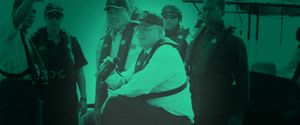COMMENT
A mosque is not a prison and Muslims don't want their 'second home' turned into one.
After the Christchurch massacre, Scott Morrison announced $55 million for an increase in security for religious places of worshipin Australia so that people might "worship and meet safely without fear". That response revealed that the point of the current political debate around the safety of Muslims had flown right over his head.
The new grants were in response to the slaughter of 50 people, by a white supremacist Australian terrorist. That perpetrator specifically chose locations in New Zealand because of their reputation for being some of the safest in the world.
When the Prime Minister (finally) responded, a full two days after the event, with a promise to increase security, he completely missed the point – we in the Muslim community are not concerned about our own mosques' security, but about the racism against Muslims and migrants ingrained in the rhetoric of the Australian government and parts of the political media that inspire extremists to attack us in the first place.
Enhancements such as "CCTV, cameras, lighting and alarms" fail to consider the fact that the terrorist was warmly welcomed into the mosque he attacked. Mosques are a house of God – they are open to the public, and anyone who may wish to enter can do so. The first victim to die in the Christchurch terror attack smiled warmly at his killer and said "welcome, brother". He died welcoming strangers into a place that is open for all.
And indeed, mosques are not simply a place of worship. People get married in mosques. They take their children to small schools and classes in mosques. Muslims mourn deaths and celebrate births in mosques, have community events and dinners and food banks in mosques. Women bring their children who run around and disturb people praying in mosques, and they are always welcome too. Mosques are a place where children grow up, the needy are taken care of, and lives are celebrated. For many, mosques are second homes.
The first victim to die in the Christchurch terror attack smiled warmly at his killer and said "welcome, brother".
And so, the suggestion that mosques increase their security is against the very nature of what a mosque is. Mosques are not prisons and should not be turned into exclusive fortresses. Somehow, Morrison believes the increased security will be "keeping Australians together".
In fact, this is another form of subtle victim blaming – it implies that maybe, had our mosques had more security, we would not have been shot. Maybe, with the aid of CCTV cameras and blaring alarms white supremacists would not attack us. Maybe if we just were more alert, we would not be in this situation.
Morrison continues to deflect responsibility for negative attitudes against Muslims that have been fostered by the government's anti-migrant and anti-Muslim rhetoric. On the evening of the March 15 massacre, Waleed Aly resurfaced (at the 3.20 mark) media reports that Morrison, at a 2011 shadow cabinet meeting, suggested his party should use community concerns about Muslims failing to integrate as a political strategy. Morrison denies both the detailed Sydney Morning Herald 2011 report of the meetingand the race-baiting, dog whistling nature of Australia's right wing politicians. And yet, only three days after the Christchurch terror attack he announced the reduction of Australia's migration cap by another 30,000.
Muslims have not forgotten the treatment they have received at the hands of the government and the media. Muslims do not need more surveillance by the government. We do not need government security and police personnel surrounding our mosques and spying on our community.
Instead, our government should stop investing in anti-Muslim, anti-migrant rhetoric, stop blaming Muslims and migrants for its incompetencies, and start listening to us in order to work collaboratively to eradicate xenophobic attitudes in Australian society that foster extremists like the one that killed 50 Muslims in Christchurch two Fridays ago.
